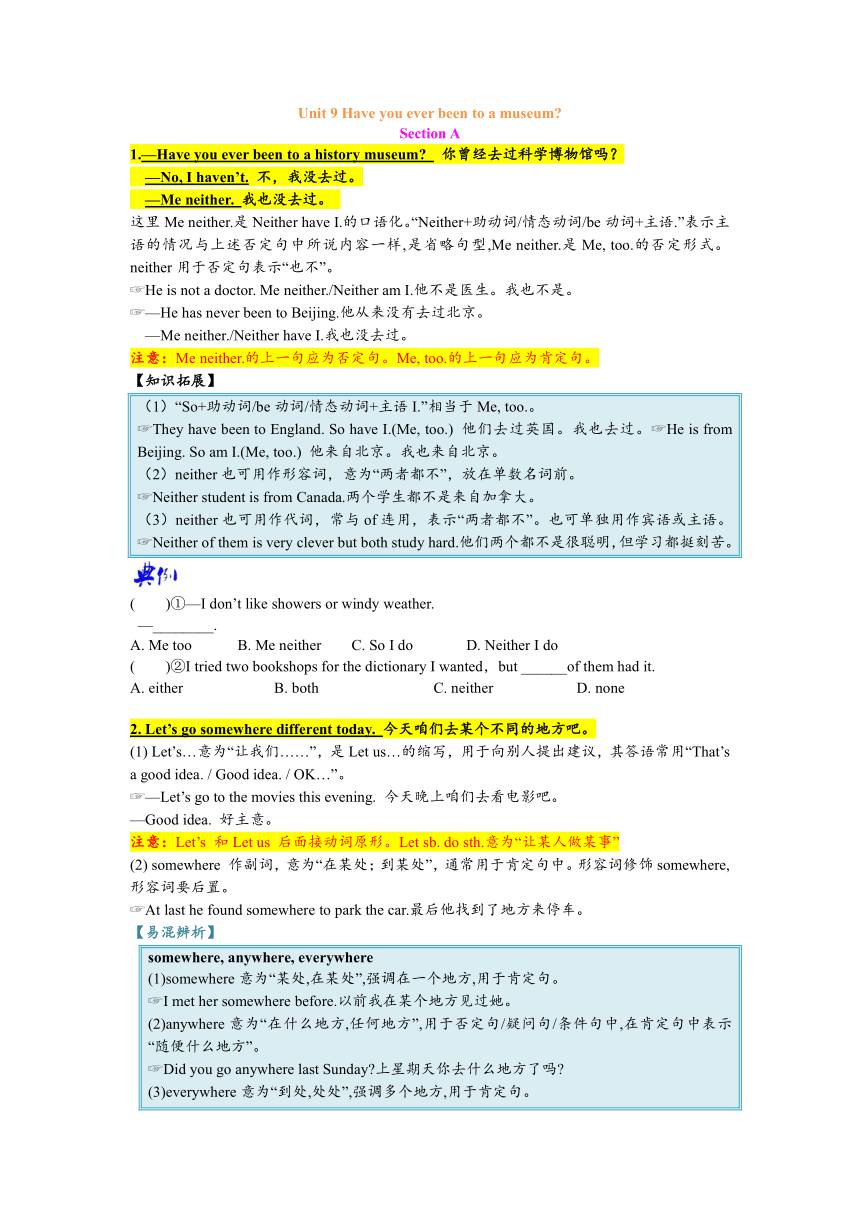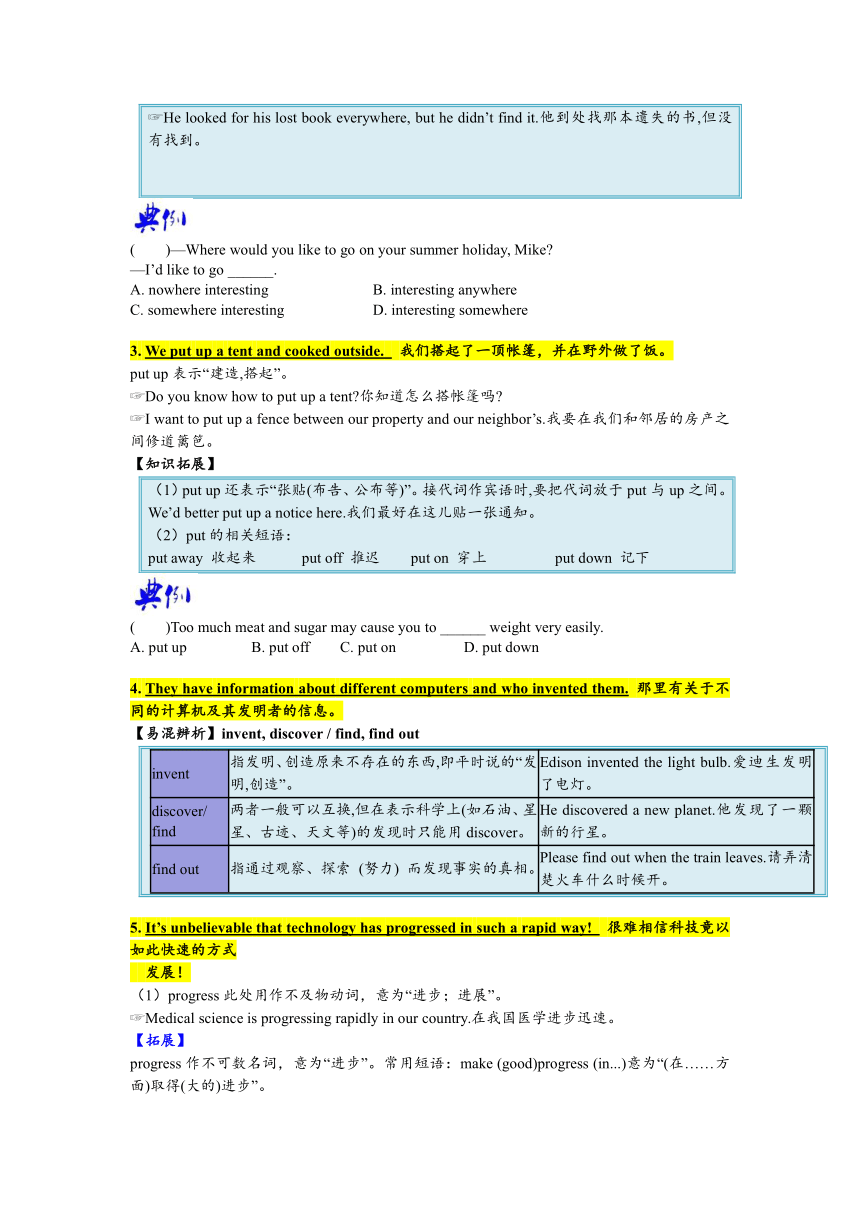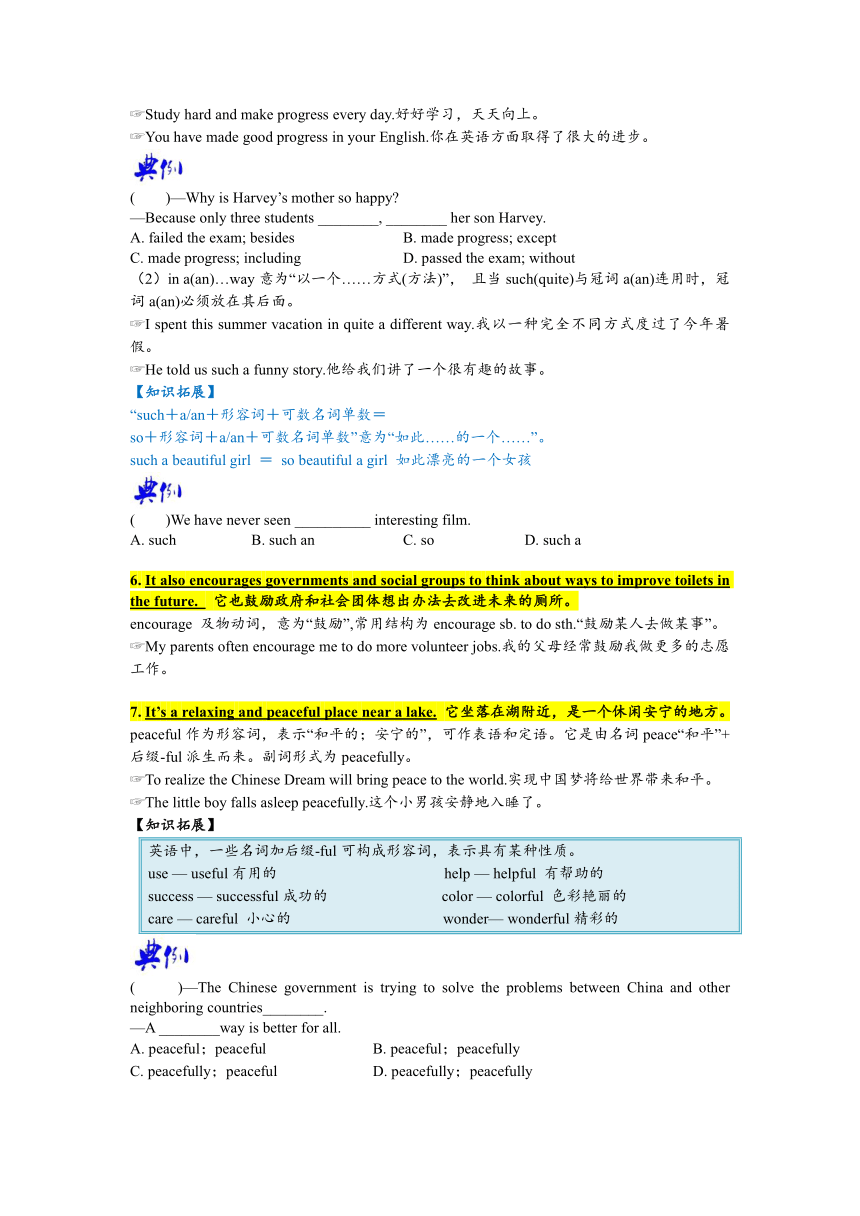Unit9 Have you ever been to a museum 知识点
文档属性
| 名称 | Unit9 Have you ever been to a museum 知识点 |  | |
| 格式 | doc | ||
| 文件大小 | 245.7KB | ||
| 资源类型 | 教案 | ||
| 版本资源 | 人教新目标(Go for it)版 | ||
| 科目 | 英语 | ||
| 更新时间 | 2022-01-07 16:53:21 | ||
图片预览



文档简介
Unit 9 Have you ever been to a museum
Section A
1.—Have you ever been to a history museum 你曾经去过科学博物馆吗?
—No, I haven’t. 不,我没去过。
—Me neither. 我也没去过。
这里Me neither.是Neither have I.的口语化。“Neither+助动词/情态动词/be动词+主语.”表示主语的情况与上述否定句中所说内容一样,是省略句型,Me neither.是Me, too.的否定形式。neither用于否定句表示“也不”。
He is not a doctor. Me neither./Neither am I.他不是医生。我也不是。
—He has never been to Beijing.他从来没有去过北京。
—Me neither./Neither have I.我也没去过。
注意:Me neither.的上一句应为否定句。Me, too.的上一句应为肯定句。
【知识拓展】
(1)“So+助动词/be动词/情态动词+主语I.”相当于Me, too.。 They have been to England. So have I.(Me, too.) 他们去过英国。我也去过。 He is from Beijing. So am I.(Me, too.) 他来自北京。我也来自北京。(2)neither也可用作形容词,意为“两者都不”,放在单数名词前。 Neither student is from Canada.两个学生都不是来自加拿大。(3)neither也可用作代词,常与of连用,表示“两者都不”。也可单独用作宾语或主语。 Neither of them is very clever but both study hard.他们两个都不是很聪明,但学习都挺刻苦。
( )①—I don’t like showers or windy weather.
—________.
A. Me too B. Me neither C. So I do D. Neither I do
( )②I tried two bookshops for the dictionary I wanted,but ______of them had it.
A. either B. both C. neither D. none
2. Let’s go somewhere different today. 今天咱们去某个不同的地方吧。
(1) Let’s…意为“让我们……”,是Let us…的缩写,用于向别人提出建议,其答语常用“That’s a good idea. / Good idea. / OK…”。
—Let’s go to the movies this evening. 今天晚上咱们去看电影吧。
—Good idea. 好主意。
注意:Let’s 和Let us 后面接动词原形。Let sb. do sth.意为“让某人做某事”
(2) somewhere 作副词,意为“在某处;到某处”,通常用于肯定句中。形容词修饰somewhere,形容词要后置。
At last he found somewhere to park the car.最后他找到了地方来停车。
【易混辨析】
somewhere, anywhere, everywhere(1)somewhere意为“某处,在某处”,强调在一个地方,用于肯定句。 I met her somewhere before.以前我在某个地方见过她。(2)anywhere意为“在什么地方,任何地方”,用于否定句/疑问句/条件句中,在肯定句中表示“随便什么地方”。 Did you go anywhere last Sunday 上星期天你去什么地方了吗 (3)everywhere意为“到处,处处”,强调多个地方,用于肯定句。 He looked for his lost book everywhere, but he didn’t find it.他到处找那本遗失的书,但没有找到。
( )—Where would you like to go on your summer holiday, Mike
—I’d like to go ______.
A. nowhere interesting B. interesting anywhere
C. somewhere interesting D. interesting somewhere
3. We put up a tent and cooked outside. 我们搭起了一顶帐篷,并在野外做了饭。
put up表示“建造,搭起”。
Do you know how to put up a tent 你知道怎么搭帐篷吗
I want to put up a fence between our property and our neighbor’s.我要在我们和邻居的房产之间修道篱笆。
【知识拓展】
(1)put up还表示“张贴(布告、公布等)”。接代词作宾语时,要把代词放于put与up之间。We’d better put up a notice here.我们最好在这儿贴一张通知。(2)put的相关短语:put away 收起来 put off 推迟 put on 穿上 put down 记下
( )Too much meat and sugar may cause you to ______ weight very easily.
A. put up B. put off C. put on D. put down
4. They have information about different computers and who invented them. 那里有关于不同的计算机及其发明者的信息。
【易混辨析】invent, discover / find, find out
invent 指发明、创造原来不存在的东西,即平时说的“发明,创造”。 Edison invented the light bulb.爱迪生发明了电灯。
discover/find 两者一般可以互换,但在表示科学上(如石油、星星、古迹、天文等)的发现时只能用discover。 He discovered a new planet.他发现了一颗新的行星。
find out 指通过观察、探索 (努力) 而发现事实的真相。 Please find out when the train leaves.请弄清楚火车什么时候开。
5. It’s unbelievable that technology has progressed in such a rapid way! 很难相信科技竟以如此快速的方式
发展!
(1)progress此处用作不及物动词,意为“进步;进展”。
Medical science is progressing rapidly in our country.在我国医学进步迅速。
【拓展】
progress作不可数名词,意为“进步”。常用短语:make (good)progress (in...)意为“(在……方面)取得(大的)进步”。
Study hard and make progress every day.好好学习,天天向上。
You have made good progress in your English.你在英语方面取得了很大的进步。
( )—Why is Harvey’s mother so happy
—Because only three students ________, ________ her son Harvey.
A. failed the exam; besides B. made progress; except
C. made progress; including D. passed the exam; without
(2)in a(an)…way意为“以一个……方式(方法)”, 且当such(quite)与冠词a(an)连用时,冠词a(an)必须放在其后面。
I spent this summer vacation in quite a different way.我以一种完全不同方式度过了今年暑假。
He told us such a funny story.他给我们讲了一个很有趣的故事。
【知识拓展】
“such+a/an+形容词+可数名词单数=
so+形容词+a/an+可数名词单数”意为“如此……的一个……”。
such a beautiful girl = so beautiful a girl 如此漂亮的一个女孩
( )We have never seen __________ interesting film.
A. such B. such an C. so D. such a
6. It also encourages governments and social groups to think about ways to improve toilets in the future. 它也鼓励政府和社会团体想出办法去改进未来的厕所。
encourage 及物动词,意为“鼓励”,常用结构为encourage sb. to do sth.“鼓励某人去做某事”。
My parents often encourage me to do more volunteer jobs.我的父母经常鼓励我做更多的志愿工作。
7. It’s a relaxing and peaceful place near a lake. 它坐落在湖附近,是一个休闲安宁的地方。
peaceful作为形容词,表示“和平的;安宁的”,可作表语和定语。它是由名词peace“和平”+后缀-ful派生而来。副词形式为peacefully。
To realize the Chinese Dream will bring peace to the world.实现中国梦将给世界带来和平。
The little boy falls asleep peacefully.这个小男孩安静地入睡了。
【知识拓展】
英语中,一些名词加后缀-ful可构成形容词,表示具有某种性质。use — useful有用的 help — helpful 有帮助的success — successful成功的 color — colorful 色彩艳丽的care — careful 小心的 wonder— wonderful精彩的
( )—The Chinese government is trying to solve the problems between China and other neighboring countries________.
—A ________way is better for all.
A. peaceful;peaceful B. peaceful;peacefully
C. peacefully;peaceful D. peacefully;peacefully
8. There are some special German paintings there right now. 那里现在有一些特别的德国油画。
German作形容词,意为“德国的;德语人的;德语的”。
She is an accountant in a German company.她在一家德国公司当会计。
【拓展】
German作名词“德国人”时,复数形式是Germans,而不是变a为e。表示“德国”要用Germany。Five Germans went back to Germany. 五个德国人回德国了。
各国人单复数变化形式: 中日不变,(单复同形Chinese—Chinese; Japanese—Japanese) 英法变,(Englishman—Englishmen; Frenchman—Frenchmen) 其余 s加后面。(German—Germans; Canadian—Canadians...)
( )—Are all the students from ________ in your class
—No, there are only 3 ________ in our class. The others are from other countries.
A. Germany; Germen B. Germany; Germans
C. German; Germans D. German; Germany
Section B
1. For thousands of tourists from China, this small island in Southeast Asia is a wonderful and safe place to take a holiday.对于许许多多的中国游客来说,东南亚的这个小岛是一个极好而又安全的度假之地。
(1)这里介词in 指小岛位于东南亚范围内。
Harbin is in the north of China.哈尔滨在中国的北部。
【归纳拓展】
to:表示两地是两个相互独立的地区,并且不相连。 Japan is to the east of China. 日本在中国东部。on: 表示两地相邻。 The State of Mongolia is on the north of China.蒙古国与中国的北部接壤。
(2)safe形容词,意为"安全的",其名词形式为safety, 意为"安全";副词形式为safely, 意为"安全地";反义词为dangerous, 意为"危险的"。
The children are safe here.孩子们在这里很安全。
( )—Are you clear about the job of a policeman, Ben
—Yes, to keep people ________ and the society in good order.
A. busy B. safe C. lucky D. healthy
【答案】B
【解析】busy繁忙的;safe安全的;lucky幸运的;healthy健康的。答句句意:是为了保证人民安全和社会的良好秩序。
2. On the one hand, more than three quarters of the population are Chinese, so you can simply speak Putonghua a lot of the time. On the other hand, Singapore is an English -speaking country, so it’s also a good place to practice your English!一方面,超过四分之三的人口都是华裔,因此很多时候你可以只讲普通话。另一方面,新加坡是一个说英语的国家,因此它也是一个你练习英语的好地方!
(1)on the one hand...on the other hand...意为"一方面……另一方面……",用于表示一个事情的两个方面。
其中on the one hand中的the可以省略。
On the one hand, you must work hard; on the other hand, you should pay attention to your health.一方面你必须努力工作,另一方面你应该注意身体。
(2)three quarters意为"四分之三"。英语中的分数表达法为:分子用基数词,分母用序数词,当分子大于一时,分母要用复数形式。
1/3 one third 2/3 two thirds
3/4 three fourths或three quarters
1/4 one/a quarter或one fourth 1/2 a half或one second
【知识拓展】
分数作主语,谓语动词的单复数取决于它代表的名词。若名词是单数/不可数名词,谓语动词用单数,若名词是可数名词复数,谓语动词用复数。 In China,two thirds of the tea is produced in the south.在中国三分之二的茶叶是在南方生产的。 In our class,two thirds of the students are girls.我们班三分之二的学生是女生。
( )①About ________ of the students like keeping diaries in English in our class.
A. two fifth B. two fifths C. second five D. two five
( )②________of the students in our class ________girls.
A. Two fifth;is B. Two fifth;are C. Two fifths;are
(3)practice在此用作及物动词,意为"练习",其后可接名词或动词-ing形式。还可用作不可数名词,意为"练习"。
I practice English every morning. 我每天早上练习英语。
Learning a new language needs a lot of practice. 学习一门新语言需要勤练不辍。
( )—Where is Tom
—He is practicing ________English _________ he can win the speech competition.
A. to speak; in order to B. speaking; so that
C. speaking; in order to D. to speak; so that
3. Whether you like Indian food, Western food or Japanese food,you’ll find it all in Singapore! 不管你喜欢印度食品、西方食品还是日本食品,你在新加坡都会找得到。
whether conj.不管……(还是);或者……(或者)。whether与or连用引导让步状语从句,意思是"不管是……或是"。
This happens whether the children are in two-parent or one-parent families.
不管孩子是生活在双亲还是单亲家庭里,这种情况都会发生。
【易混辨析】whether与if
(1)whether与if的相同点:二者皆意为"是否",引导宾语从句时二者可以互换。 He didn’t tell me if/whether he would come.他没有告诉我他是否会来。(2)whether与if的不同点:①下列情况只能用whether,不能用if。a.有or not时要用whether。 I don’t know whether he will come or not.我不知道他是否会来。b.宾语从句置于句首时。 Whether this is true or not,I can not say.我不能说这是真是假。c.宾语是不定式时用whether。 I didn’t know whether to laugh or to cry.我不知道是该笑还是该哭。d.引导的从句作介词的宾语时。 It depends on whether it will be fine.这取决于天气是否会晴朗。②if引导条件状语从句,其时态遵循"主将从现" 原则。
( )①—What about going to the South Lake for a picnic next weekend
—OK. But I’m not sure ________ it will rain.
A. why B. where C. when D. whether
( )②—Dad, I’ve finished my homework.
—Good, and ________ you play or watch TV, you mustn’t disturb(打扰) me.
A.whenever B.Whether C.whatever D.no matter
4.It might seem strange to go to a zoo when it’s dark. 天黑时去动物园似乎很奇怪。
seem好像,似乎,看来,是连系动词,可以接形容词。
That may not seem possible now.现在那似乎不可能了。
【知识拓展】
常用的句型:主语 + seem + (to be) +表语;It seems + that从句;主语 + seem + 不定式。 Tom seems (to be) a very clever boy.汤姆看上去是一个非常聪明的男孩。 It seems that he is happy today.今天他似乎很高兴。 Tom seems to know our city very well.汤姆好像很熟悉我们的城市。 It seems that he understands the meaning of the word.=He seems to understand the meaning of the word.他似乎理解这个单词的意思。
Grammar
现在完成时(二)
含been, ever, never的现在完成时,been是be动词的过去分词,ever(曾经),never(从不,未曾)一般作副词。
been在完成时中,常以have been的形式出现,常见的有以下几种用法:
考点1 have been to+地点
have been to 曾经去过 现已回来 可接次数 He has been to Beijing 3 times.他去过北京三次。
have gone to 到某地去了 尚未回来 通常不用第一人称 She’s not here. She has gone to Qingdao.她不在这里,她去了青岛。
have been in/at 在某地呆了多长时间 常接时间段 He has been in London for half a year.他在伦敦呆了半年。
( )—Ben and Sue aren’t home,are they
—No. They ________ to London on business.
A. have gone B. go C. have been D. will go
考点2 当have been to后面接副词,如here, there, home时,to要省略。变为have been here/there/home。
( )You said that Zhijin Cave is very beautiful.________ you ________ there?
A. Have;gone B. Have;been C. Have;gone to D. Have;been to
考点3 have been in+组织,表示加入某组织。
He has been in the army for 3 years.他参军三年了。
考点4 have been+adj./n.呈现……状态
The shop has been open for 10 years. 这家店营业十年了。We have been friends since we were 5. 我们从5岁起就一直是朋友。
考点5 ever, never常与现在完成时连用,是现在完成时态的提示词。
ever adv.曾经;在任何时候
never adv.从未
—Have you ever been there?你曾去过那里吗?
—No, I have never been there before. 不,我以前从未去过那里。
( )Tony is very nice. He is the most enjoyable person I ________.
A. meet ever B. have ever met C. had ever met
Section A
1.—Have you ever been to a history museum 你曾经去过科学博物馆吗?
—No, I haven’t. 不,我没去过。
—Me neither. 我也没去过。
这里Me neither.是Neither have I.的口语化。“Neither+助动词/情态动词/be动词+主语.”表示主语的情况与上述否定句中所说内容一样,是省略句型,Me neither.是Me, too.的否定形式。neither用于否定句表示“也不”。
He is not a doctor. Me neither./Neither am I.他不是医生。我也不是。
—He has never been to Beijing.他从来没有去过北京。
—Me neither./Neither have I.我也没去过。
注意:Me neither.的上一句应为否定句。Me, too.的上一句应为肯定句。
【知识拓展】
(1)“So+助动词/be动词/情态动词+主语I.”相当于Me, too.。 They have been to England. So have I.(Me, too.) 他们去过英国。我也去过。 He is from Beijing. So am I.(Me, too.) 他来自北京。我也来自北京。(2)neither也可用作形容词,意为“两者都不”,放在单数名词前。 Neither student is from Canada.两个学生都不是来自加拿大。(3)neither也可用作代词,常与of连用,表示“两者都不”。也可单独用作宾语或主语。 Neither of them is very clever but both study hard.他们两个都不是很聪明,但学习都挺刻苦。
( )①—I don’t like showers or windy weather.
—________.
A. Me too B. Me neither C. So I do D. Neither I do
( )②I tried two bookshops for the dictionary I wanted,but ______of them had it.
A. either B. both C. neither D. none
2. Let’s go somewhere different today. 今天咱们去某个不同的地方吧。
(1) Let’s…意为“让我们……”,是Let us…的缩写,用于向别人提出建议,其答语常用“That’s a good idea. / Good idea. / OK…”。
—Let’s go to the movies this evening. 今天晚上咱们去看电影吧。
—Good idea. 好主意。
注意:Let’s 和Let us 后面接动词原形。Let sb. do sth.意为“让某人做某事”
(2) somewhere 作副词,意为“在某处;到某处”,通常用于肯定句中。形容词修饰somewhere,形容词要后置。
At last he found somewhere to park the car.最后他找到了地方来停车。
【易混辨析】
somewhere, anywhere, everywhere(1)somewhere意为“某处,在某处”,强调在一个地方,用于肯定句。 I met her somewhere before.以前我在某个地方见过她。(2)anywhere意为“在什么地方,任何地方”,用于否定句/疑问句/条件句中,在肯定句中表示“随便什么地方”。 Did you go anywhere last Sunday 上星期天你去什么地方了吗 (3)everywhere意为“到处,处处”,强调多个地方,用于肯定句。 He looked for his lost book everywhere, but he didn’t find it.他到处找那本遗失的书,但没有找到。
( )—Where would you like to go on your summer holiday, Mike
—I’d like to go ______.
A. nowhere interesting B. interesting anywhere
C. somewhere interesting D. interesting somewhere
3. We put up a tent and cooked outside. 我们搭起了一顶帐篷,并在野外做了饭。
put up表示“建造,搭起”。
Do you know how to put up a tent 你知道怎么搭帐篷吗
I want to put up a fence between our property and our neighbor’s.我要在我们和邻居的房产之间修道篱笆。
【知识拓展】
(1)put up还表示“张贴(布告、公布等)”。接代词作宾语时,要把代词放于put与up之间。We’d better put up a notice here.我们最好在这儿贴一张通知。(2)put的相关短语:put away 收起来 put off 推迟 put on 穿上 put down 记下
( )Too much meat and sugar may cause you to ______ weight very easily.
A. put up B. put off C. put on D. put down
4. They have information about different computers and who invented them. 那里有关于不同的计算机及其发明者的信息。
【易混辨析】invent, discover / find, find out
invent 指发明、创造原来不存在的东西,即平时说的“发明,创造”。 Edison invented the light bulb.爱迪生发明了电灯。
discover/find 两者一般可以互换,但在表示科学上(如石油、星星、古迹、天文等)的发现时只能用discover。 He discovered a new planet.他发现了一颗新的行星。
find out 指通过观察、探索 (努力) 而发现事实的真相。 Please find out when the train leaves.请弄清楚火车什么时候开。
5. It’s unbelievable that technology has progressed in such a rapid way! 很难相信科技竟以如此快速的方式
发展!
(1)progress此处用作不及物动词,意为“进步;进展”。
Medical science is progressing rapidly in our country.在我国医学进步迅速。
【拓展】
progress作不可数名词,意为“进步”。常用短语:make (good)progress (in...)意为“(在……方面)取得(大的)进步”。
Study hard and make progress every day.好好学习,天天向上。
You have made good progress in your English.你在英语方面取得了很大的进步。
( )—Why is Harvey’s mother so happy
—Because only three students ________, ________ her son Harvey.
A. failed the exam; besides B. made progress; except
C. made progress; including D. passed the exam; without
(2)in a(an)…way意为“以一个……方式(方法)”, 且当such(quite)与冠词a(an)连用时,冠词a(an)必须放在其后面。
I spent this summer vacation in quite a different way.我以一种完全不同方式度过了今年暑假。
He told us such a funny story.他给我们讲了一个很有趣的故事。
【知识拓展】
“such+a/an+形容词+可数名词单数=
so+形容词+a/an+可数名词单数”意为“如此……的一个……”。
such a beautiful girl = so beautiful a girl 如此漂亮的一个女孩
( )We have never seen __________ interesting film.
A. such B. such an C. so D. such a
6. It also encourages governments and social groups to think about ways to improve toilets in the future. 它也鼓励政府和社会团体想出办法去改进未来的厕所。
encourage 及物动词,意为“鼓励”,常用结构为encourage sb. to do sth.“鼓励某人去做某事”。
My parents often encourage me to do more volunteer jobs.我的父母经常鼓励我做更多的志愿工作。
7. It’s a relaxing and peaceful place near a lake. 它坐落在湖附近,是一个休闲安宁的地方。
peaceful作为形容词,表示“和平的;安宁的”,可作表语和定语。它是由名词peace“和平”+后缀-ful派生而来。副词形式为peacefully。
To realize the Chinese Dream will bring peace to the world.实现中国梦将给世界带来和平。
The little boy falls asleep peacefully.这个小男孩安静地入睡了。
【知识拓展】
英语中,一些名词加后缀-ful可构成形容词,表示具有某种性质。use — useful有用的 help — helpful 有帮助的success — successful成功的 color — colorful 色彩艳丽的care — careful 小心的 wonder— wonderful精彩的
( )—The Chinese government is trying to solve the problems between China and other neighboring countries________.
—A ________way is better for all.
A. peaceful;peaceful B. peaceful;peacefully
C. peacefully;peaceful D. peacefully;peacefully
8. There are some special German paintings there right now. 那里现在有一些特别的德国油画。
German作形容词,意为“德国的;德语人的;德语的”。
She is an accountant in a German company.她在一家德国公司当会计。
【拓展】
German作名词“德国人”时,复数形式是Germans,而不是变a为e。表示“德国”要用Germany。Five Germans went back to Germany. 五个德国人回德国了。
各国人单复数变化形式: 中日不变,(单复同形Chinese—Chinese; Japanese—Japanese) 英法变,(Englishman—Englishmen; Frenchman—Frenchmen) 其余 s加后面。(German—Germans; Canadian—Canadians...)
( )—Are all the students from ________ in your class
—No, there are only 3 ________ in our class. The others are from other countries.
A. Germany; Germen B. Germany; Germans
C. German; Germans D. German; Germany
Section B
1. For thousands of tourists from China, this small island in Southeast Asia is a wonderful and safe place to take a holiday.对于许许多多的中国游客来说,东南亚的这个小岛是一个极好而又安全的度假之地。
(1)这里介词in 指小岛位于东南亚范围内。
Harbin is in the north of China.哈尔滨在中国的北部。
【归纳拓展】
to:表示两地是两个相互独立的地区,并且不相连。 Japan is to the east of China. 日本在中国东部。on: 表示两地相邻。 The State of Mongolia is on the north of China.蒙古国与中国的北部接壤。
(2)safe形容词,意为"安全的",其名词形式为safety, 意为"安全";副词形式为safely, 意为"安全地";反义词为dangerous, 意为"危险的"。
The children are safe here.孩子们在这里很安全。
( )—Are you clear about the job of a policeman, Ben
—Yes, to keep people ________ and the society in good order.
A. busy B. safe C. lucky D. healthy
【答案】B
【解析】busy繁忙的;safe安全的;lucky幸运的;healthy健康的。答句句意:是为了保证人民安全和社会的良好秩序。
2. On the one hand, more than three quarters of the population are Chinese, so you can simply speak Putonghua a lot of the time. On the other hand, Singapore is an English -speaking country, so it’s also a good place to practice your English!一方面,超过四分之三的人口都是华裔,因此很多时候你可以只讲普通话。另一方面,新加坡是一个说英语的国家,因此它也是一个你练习英语的好地方!
(1)on the one hand...on the other hand...意为"一方面……另一方面……",用于表示一个事情的两个方面。
其中on the one hand中的the可以省略。
On the one hand, you must work hard; on the other hand, you should pay attention to your health.一方面你必须努力工作,另一方面你应该注意身体。
(2)three quarters意为"四分之三"。英语中的分数表达法为:分子用基数词,分母用序数词,当分子大于一时,分母要用复数形式。
1/3 one third 2/3 two thirds
3/4 three fourths或three quarters
1/4 one/a quarter或one fourth 1/2 a half或one second
【知识拓展】
分数作主语,谓语动词的单复数取决于它代表的名词。若名词是单数/不可数名词,谓语动词用单数,若名词是可数名词复数,谓语动词用复数。 In China,two thirds of the tea is produced in the south.在中国三分之二的茶叶是在南方生产的。 In our class,two thirds of the students are girls.我们班三分之二的学生是女生。
( )①About ________ of the students like keeping diaries in English in our class.
A. two fifth B. two fifths C. second five D. two five
( )②________of the students in our class ________girls.
A. Two fifth;is B. Two fifth;are C. Two fifths;are
(3)practice在此用作及物动词,意为"练习",其后可接名词或动词-ing形式。还可用作不可数名词,意为"练习"。
I practice English every morning. 我每天早上练习英语。
Learning a new language needs a lot of practice. 学习一门新语言需要勤练不辍。
( )—Where is Tom
—He is practicing ________English _________ he can win the speech competition.
A. to speak; in order to B. speaking; so that
C. speaking; in order to D. to speak; so that
3. Whether you like Indian food, Western food or Japanese food,you’ll find it all in Singapore! 不管你喜欢印度食品、西方食品还是日本食品,你在新加坡都会找得到。
whether conj.不管……(还是);或者……(或者)。whether与or连用引导让步状语从句,意思是"不管是……或是"。
This happens whether the children are in two-parent or one-parent families.
不管孩子是生活在双亲还是单亲家庭里,这种情况都会发生。
【易混辨析】whether与if
(1)whether与if的相同点:二者皆意为"是否",引导宾语从句时二者可以互换。 He didn’t tell me if/whether he would come.他没有告诉我他是否会来。(2)whether与if的不同点:①下列情况只能用whether,不能用if。a.有or not时要用whether。 I don’t know whether he will come or not.我不知道他是否会来。b.宾语从句置于句首时。 Whether this is true or not,I can not say.我不能说这是真是假。c.宾语是不定式时用whether。 I didn’t know whether to laugh or to cry.我不知道是该笑还是该哭。d.引导的从句作介词的宾语时。 It depends on whether it will be fine.这取决于天气是否会晴朗。②if引导条件状语从句,其时态遵循"主将从现" 原则。
( )①—What about going to the South Lake for a picnic next weekend
—OK. But I’m not sure ________ it will rain.
A. why B. where C. when D. whether
( )②—Dad, I’ve finished my homework.
—Good, and ________ you play or watch TV, you mustn’t disturb(打扰) me.
A.whenever B.Whether C.whatever D.no matter
4.It might seem strange to go to a zoo when it’s dark. 天黑时去动物园似乎很奇怪。
seem好像,似乎,看来,是连系动词,可以接形容词。
That may not seem possible now.现在那似乎不可能了。
【知识拓展】
常用的句型:主语 + seem + (to be) +表语;It seems + that从句;主语 + seem + 不定式。 Tom seems (to be) a very clever boy.汤姆看上去是一个非常聪明的男孩。 It seems that he is happy today.今天他似乎很高兴。 Tom seems to know our city very well.汤姆好像很熟悉我们的城市。 It seems that he understands the meaning of the word.=He seems to understand the meaning of the word.他似乎理解这个单词的意思。
Grammar
现在完成时(二)
含been, ever, never的现在完成时,been是be动词的过去分词,ever(曾经),never(从不,未曾)一般作副词。
been在完成时中,常以have been的形式出现,常见的有以下几种用法:
考点1 have been to+地点
have been to 曾经去过 现已回来 可接次数 He has been to Beijing 3 times.他去过北京三次。
have gone to 到某地去了 尚未回来 通常不用第一人称 She’s not here. She has gone to Qingdao.她不在这里,她去了青岛。
have been in/at 在某地呆了多长时间 常接时间段 He has been in London for half a year.他在伦敦呆了半年。
( )—Ben and Sue aren’t home,are they
—No. They ________ to London on business.
A. have gone B. go C. have been D. will go
考点2 当have been to后面接副词,如here, there, home时,to要省略。变为have been here/there/home。
( )You said that Zhijin Cave is very beautiful.________ you ________ there?
A. Have;gone B. Have;been C. Have;gone to D. Have;been to
考点3 have been in+组织,表示加入某组织。
He has been in the army for 3 years.他参军三年了。
考点4 have been+adj./n.呈现……状态
The shop has been open for 10 years. 这家店营业十年了。We have been friends since we were 5. 我们从5岁起就一直是朋友。
考点5 ever, never常与现在完成时连用,是现在完成时态的提示词。
ever adv.曾经;在任何时候
never adv.从未
—Have you ever been there?你曾去过那里吗?
—No, I have never been there before. 不,我以前从未去过那里。
( )Tony is very nice. He is the most enjoyable person I ________.
A. meet ever B. have ever met C. had ever met
同课章节目录
- Unit 1 What's the matter?
- Section A
- Section B
- Unit 2 I'll help to clean up the city parks.
- Section A
- Section B
- Unit 3 Could you please clean your room?
- Section A
- Section B
- Unit 4 Why don't you talk to your parents?
- Section A
- Section B
- Unit 5 What were you doing when the rainstorm came
- Section A
- Section B
- Review of Units 1-5
- Unit 6 An old man tried to move the mountains.
- Section A
- Section B
- Unit 7 What's the highest mountain in the world?
- Section A
- Section B
- Unit 8 Have you read Treasure Island yet?
- Section A
- Section B
- Unit 9 Have you ever been to a museum?
- Section A
- Section B
- Unit 10 I've had this bike for three years.
- Section A
- Section B
